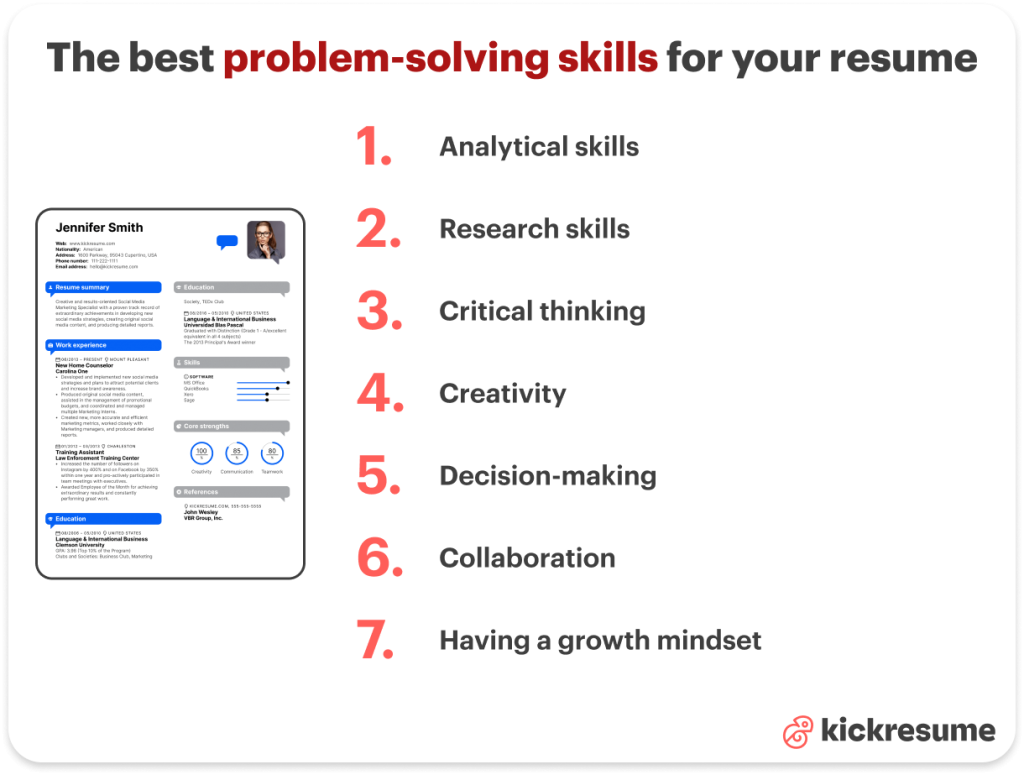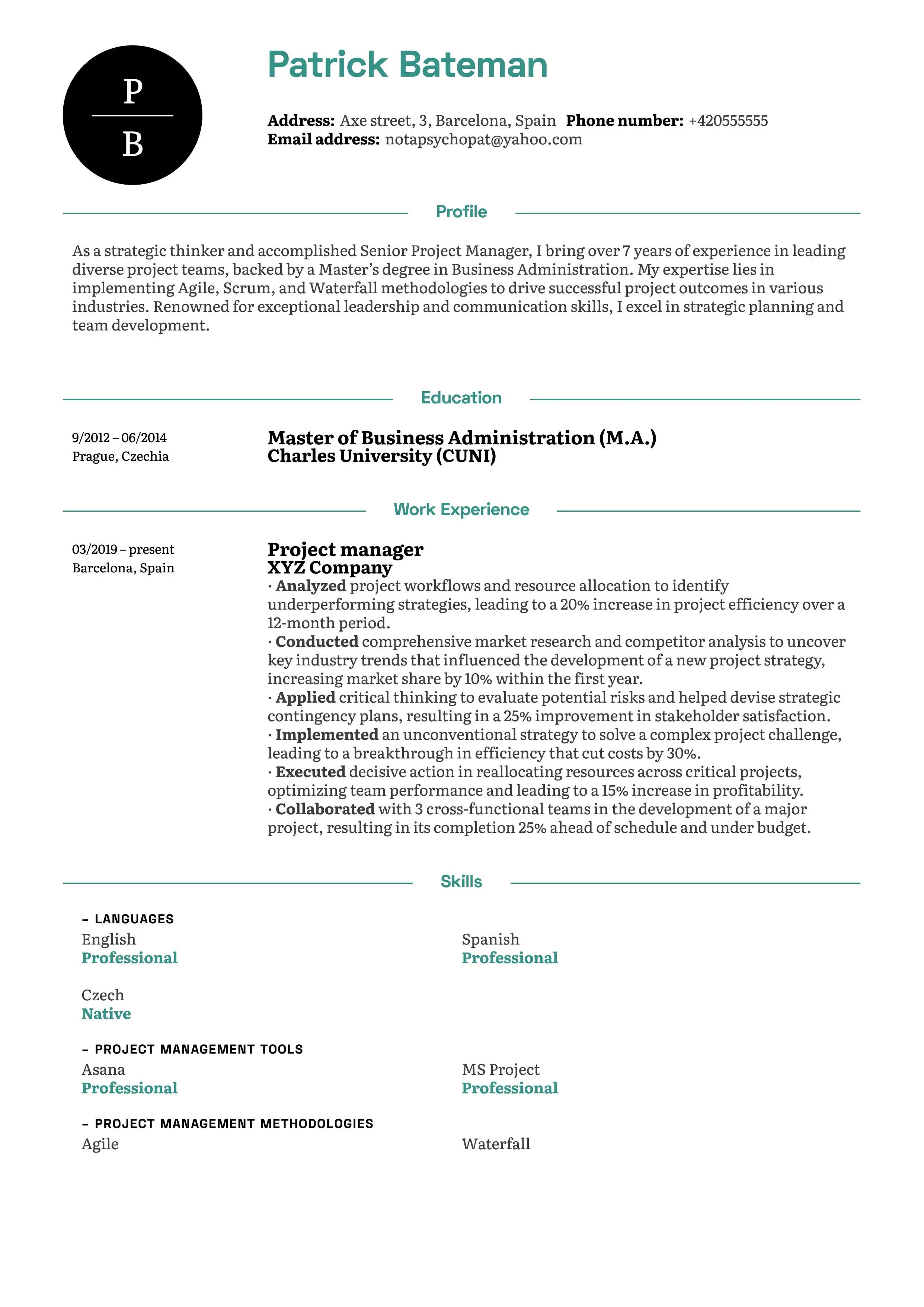Problem-solving skills are something everybody should include on their resume, yet only a few seem to understand what these skills actually are. If you've always felt that the term "problem-solving skills" is rather vague and wanted to know more, you've come to the right place.
In this article, we're going to explain what problem-solving skills really mean. We'll talk about what makes up good problem-solving skills and give you tips on how to get better at them. You'll also find out how to make your problem-solving abilities look more impressive to those who might want to hire you.
Sounds good, right? Curious to learn more?
In this article we’ll show you:
- What are problem solving skills;
- Why are they important;
- Specific problem solving skills examples;
- How to develop your problem solving skills;
- And, how to showcase them on your resume.
What are problem solving skills?
First of all, they're more than just a buzzword!
Problem-solving skills are a set of specific abilities that allow you to deal with unexpected situations in the workplace, whether it be job related or team related.
It's a complex process that involves several “sub skills” or “sub steps,” namely:
- Recognizing and identifying the issue at hand.
- Breaking the problem down into smaller parts and analyzing how they relate to one another.
- Creating potential solutions to the problem, evaluating them and picking the best one.
- Applying the chosen solution and assessing its outcome.
- Learning from the whole process to deal with future problems more effectively.
As you can see, it's not just about solving problems that are right in front of us, but also about predicting potential issues and being prepared to deal with them before they arise.
Why are problem solving skills important?
Despite what you may believe, problem-solving skills aren't just for managers.
Think about it this way: Why do employers hire employees in the first place? To solve problems for them!
And, as we all know, problems don't discriminate. In other words, it doesn't matter whether you're just an intern, an entry-level professional, or a seasoned veteran, you'll constantly face some kind of challenges. And the only difference is in how complex they will get.
This is also reflected in the way employers assess suitability of potential job candidates.
In fact, research shows that the ability to deal with unexpected complications is prioritized by an overwhelming 60% of employers across all industries, making it one of the most compelling skills on your resume.
So, regardless of your job description or your career level, you're always expected to find solutions for problems, either independently or as a part of a team.
And that's precisely what makes problem-solving skills so invaluable and universal!
The best 7 problem solving skills examples
As we've said before, problem-solving isn't really just one single skill.
Instead, your ability to handle workplace issues with composure depends on several different “sub-skills”.
So, which specific skills make an employee desirable even for the most demanding of recruiters?
In no particular order, you should focus on these 7 skills:
- Analytical skills
- Research skills
- Critical thinking
- Creativity
- Decision-making
- Collaboration
- Having a growth mindset
Let's have a look at each of them in greater detail!
#1 Analytical skills
Firstly, to truly understand complex problems, you need to break them down into more manageable parts. Then, you observe them closely and ask yourself: “Which parts work and which don't,” How do these parts contribute to the problem as a whole,” and "What exactly needs to be fixed?” In other words, you gather data, you study it, and compare it - all to pinpoint the cause of the issue as closely as possible.
#2 Research skills
Another priceless tool is your research skills (sometimes relying on just one source of information isn't enough). Besides, to make a truly informed decision, you'll have to dig a little deeper. Being a good researcher means looking for potential solutions to a problem in a wider context. For example: going through team reports, customer feedback, quarterly sales or current market trends.
#3 Critical thinking
Every employer wants to hire people who can think critically. Yet, the ability to evaluate situations objectively and from different perspectives, is actually pretty hard to come by. But as long as you stay open-minded, inquisitive, and with a healthy dose of skepticism, you'll be able to assess situations based on facts and evidence more successfully. Plus, critical thinking comes in especially handy when you need to examine your own actions and processes.
#4 Creativity
Instead of following the old established processes that don't work anymore, you should feel comfortable thinking outside the box. The thing is, problems have a nasty habit of popping up unexpectedly and rapidly. And sometimes, you have to get creative in order to solve them fast. Especially those that have no precedence. But this requires a blend of intuition, industry knowledge, and quick thinking - a truly rare combination.
#5 Decision-making
The analysis, research, and brainstorming are done. Now, you need to look at the possible solutions, and make the final decision (informed, of course). And not only that, you also have to stand by it! Because once the train gets moving, there's no room for second guessing. Also, keep in mind that you need to be prepared to take responsibility for all decisions you make. That's no small feat!
#6 Collaboration
Not every problem you encounter can be solved by yourself alone. And this is especially true when it comes to complex projects. So, being able to actively listen to your colleagues, take their ideas into account, and being respectful of their opinions enables you to solve problems together. Because every individual can offer a unique perspective and skill set. Yes, democracy is hard, but at the end of the day, it's teamwork that makes the corporate world go round.
#7 Having a growth mindset
Let's be honest, no one wants their work to be riddled with problems. But facing constant challenges and changes is inevitable. And that can be scary! However, when you're able to see these situations as opportunities to grow instead of issues that hold you back, your problem solving skills reach new heights. And the employers know that too!

How to develop problem solving skills
Now that we've shown you the value problem-solving skills can add to your resume, let's ask the all-important question: “How can I learn them?”
Well…you can't. At least not in the traditional sense of the word.
Let us explain: Since problem-solving skills fall under the umbrella of soft skills, they can't be taught through formal education, unlike computer skills for example. There's no university course that you can take and graduate as a professional problem solver.
But, just like other interpersonal skills, they can be nurtured and refined over time through practice and experience.
Unfortunately, there's no one-size-fits-all approach, but the following tips can offer you inspiration on how to improve your problem solving skills:
- Cultivate a growth mindset. Remember what we've said before? Your attitude towards obstacles is the first step to unlocking your problem-solving potential.
- Gain further knowledge in your specialized field. Secondly, it's a good idea to delve a little deeper into your chosen profession. Because the more you read on a subject, the easier it becomes to spot certain patterns and relations.
- Start with small steps. Don't attack the big questions straight away — you'll only set yourself up for failure. Instead, start with more straightforward tasks and work your way up to more complex problems.
- Break problems down into more digestible pieces. Complex issues are made up of smaller problems. And those can be further divided into even smaller problems, and so on. Until you're left with only the basics.
- Don't settle for a single solution. Instead, keep on exploring other possible answers.
- Accept failure as a part of the learning process. Finally, don't let your failures discourage you. After all, you're bound to misstep a couple of times before you find your footing. Just keep on practicing.

How to improve problem solving skills with online courses
While it’s true that formal education won’t turn you into a master problem solver, you can still hone your skills with courses and certifications offered by online learning platforms:
- Analytical skills. You can sharpen your analytical skills with Data Analytics Basics for Everyone from IBM provided by edX (Free); or Decision Making and Analytical Thinking: Fortune 500 provided by Udemy ($21,74).
- Creativity. And, to unlock your inner creative mind, you can try Creative Thinking: Techniques and Tools for Success from the Imperial College London provided by Coursera (Free).
- Critical thinking. Try Introduction to Logic and Critical Thinking Specialization from Duke University provided by Coursera (Free); or Logical and Critical Thinking offered by The University of Auckland via FutureLearn.
- Decision-making. Or, you can learn how to become more confident when it's time to make a decision with Decision-Making Strategies and Executive Decision-Making both offered by LinkedIn Learning (1 month free trial).
- Communication skills. Lastly, to improve your collaborative skills, check out Communicating for Influence and Impact online at University of Cambridge.
Problem solving skills resume example
The fact that everybody and their grandmothers put “problem-solving skills” on their CVs has turned the phrase into a cliche.
But there's a way to incorporate these skills into your resume without sounding pretentious and empty. Below, we've prepared a mock-up resume that manages to do just that.
FYI, if you like this design, you can use the template to create your very own resume. Just click the red button and fill in your information (or let the AI do it for you).
Why this example works?
- Firstly, the job description itself is neatly organized into bullet points.
- Instead of simply listing soft skills in a skills section, you can incorporate them into the description of your work experience entry.
- Also, the language here isn't vague. This resume puts each problem-solving skill into a real-life context by detailing specific situations and obstacles.
- And, to highlight the impact of each skill on your previous job position, we recommend quantifying your results whenever possible.
- Finally, starting each bullet point with an action verb (in bold) makes you look more dynamic and proactive.
Key takeaways: Problem solving skills
To sum it all up, problem-solving skills continue gaining popularity among employers and employees alike. And for a good reason!
Because of them, you can overcome any obstacles that stand in the way of your professional life more efficiently and systematically.
In essence, problem-solving skills refer to the ability to recognize a challenge, identify its root cause, think of possible solutions, and then implement the most effective one.
Believing that these skills are all the same would be a serious misconception. In reality, this term encompasses a variety of different abilities, including:
- Analytical skills
- Research skills
- Critical thinking
- Creativity
- Decision-making
- Collaboration
- Having a growth mindset
In short, understanding, developing, and showcasing these skills, can greatly boost your chances at getting noticed by the hiring managers. So, don't hesitate and start working on your problem-solving skills right now!




